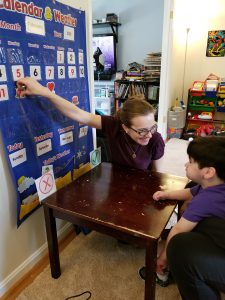 My last few sessions with Joey have been quiet, as his AAC device was taken away for repairs over the school system’s winter break. The device was losing power, and appeared to be taking longer and longer to read Joey’s eyes. This slow and unreliable response time was most likely what was causing Joey’s communication regression so it is good that it is getting fixed. These silent three weeks, however, are such a reminder of how important access to words is for Joey.
My last few sessions with Joey have been quiet, as his AAC device was taken away for repairs over the school system’s winter break. The device was losing power, and appeared to be taking longer and longer to read Joey’s eyes. This slow and unreliable response time was most likely what was causing Joey’s communication regression so it is good that it is getting fixed. These silent three weeks, however, are such a reminder of how important access to words is for Joey.
When I was getting ready to go see Joey on Wednesday, my seven year old daughter, home on winter break, was following me around asking me questions about what I was up to. She met Joey last winter, and was hoping she could come along this trip. I mentioned that his talker was broken and she gasped in horror. “What? Mommy! That’s not fair! That’s how he TALKS!”
“I know! Can you imagine if you couldn’t talk to your family for three weeks?”
Her mouth fell open.
“But why would they do that?” she repeated, unable to get past the injustice.
As adults we can understand the need to have the device fixed, and the logic behind having it fixed over the holidays when school is out so the language demands are less. That’s pretty clear adult logic, right? To my daughter, this made no sense. “But you have to talk over Christmas!” she exploded, following me around as I tried to get materials ready for Joey. “We don’t only talk with our teachers!! We have more important things to talk about!”
So true. But the device needs to be fixed, and allowing him to continue to grow frustrated with a slow, unresponsive device isn’t a good option either. The last thing we need is for Joey to give up on the device because he does not trust it to share his thoughts.
Wednesday’s session was quiet. It was strange to read books with Joey without his commentary, or for me to give him opportunities to fill in the blank with words. I’d still pause so he could fill in the words from the story, and still asked him questions about the book, and he would still respond with some oral approximations. He was engaged and happy, but it reminded me of just how much I’ve been able to get to know Joey and his insights because of the device. If I didn’t know what he was capable of, we’d have every session like this, with me wondering if he was just making noises to fill in the gap, or if his utterances were meaningful. I’d have no idea just how capable he is.
One upside to these silent weeks is that I am able to take data on his communication patterns without the device, which was insightful to see. I typically avoid doing this because I never want to deny him his words, but since the device wasn’t there anyway, I had the perfect opportunity to see how he communicates without it. In one ten minute measurement he had seven oral utterances, used gestures to communicate a demand three times, and used a low-tech eye gaze (yes/no cards) three times. None of his oral utterances were clearly recognizable, although given the context I could infer what he was saying.


